Top Web Hosting Solutions for Small Businesses in 2025
Selecting the right web hosting provider for your small business is among the most vital choices you’ll face. Your web host serves as the backbone of your company’s online presence. An excellent hosting service ensures that your site runs quickly, securely, and remains consistently accessible to your customers. On the other hand, opting for a subpar hosting service can result in lost revenue, irritated site visitors, and a cascade of ongoing problems.
But with hundreds of options, how do you find the right fit?
This guide simplifies the overwhelming process of selecting a web hosting service by providing a clear analysis of the leading providers. We’ve evaluated these companies based on critical factors that are most significant to small businesses, such as performance, security, customer support, scalability options, and pricing. Not only will we present you with our top recommended choices, but we will also guide you through the criteria to help you identify and choose the ideal hosting service tailored to your unique business requirements.
Quick Picks: The Best Small Business Hosting at a Glance
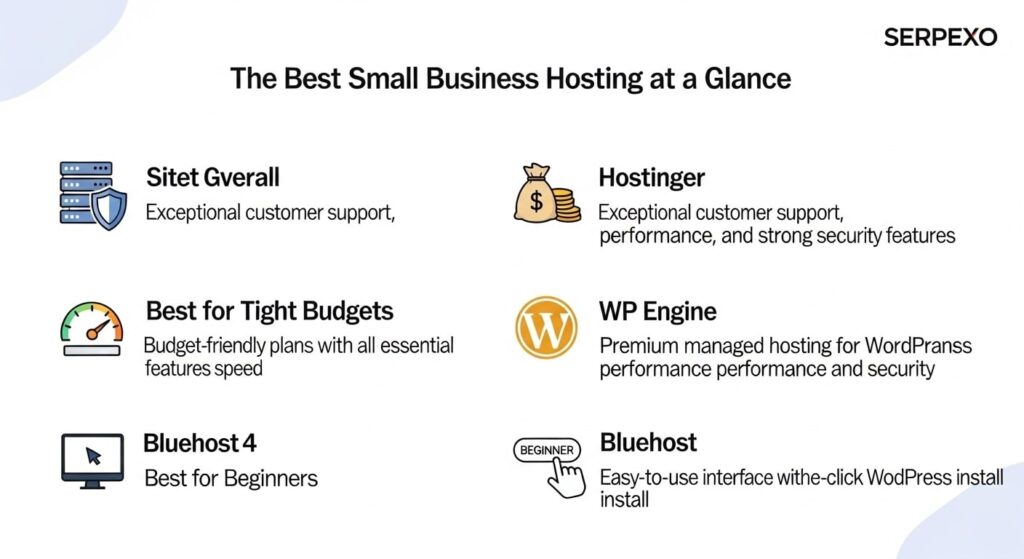
For those in a hurry, here are our top recommendations:
- Best Overall: SiteGround – Exceptional customer support, outstanding performance, and strong security features position it as the top all-around option.
- Best for Tight Budgets: Hostinger – Exceptionally budget-friendly entry-level plans that still deliver all the necessary features and impressive speed.
- Best for WordPress: WP Engine – For businesses that prioritize their WordPress site’s performance and security, WP Engine offers a premium, managed hosting solution designed specifically to meet these high standards.
- Best for Beginners: Bluehost – An intuitive interface combined with a seamless one-click WordPress installation, which is officially endorsed by WordPress.org.
Before You Choose: Understanding Web Hosting Essentials
To make an informed decision, you need to understand the basics.
What Exactly is Web Hosting?
Imagine your website as a house constructed from files, images, and code. Web hosting acts as the plot of land your house occupies, enabling its accessibility to online visitors. Essentially, a hosting provider leases you space on their servers, which are robust computers designed to store your website’s files. This ensures that when someone enters your domain name into their browser, your site appears swiftly and reliably. Thus, web hosting plays a critical role in ensuring your website is efficiently available to the public whenever they seek it.
Types of Hosting Explained (In Simple Terms)
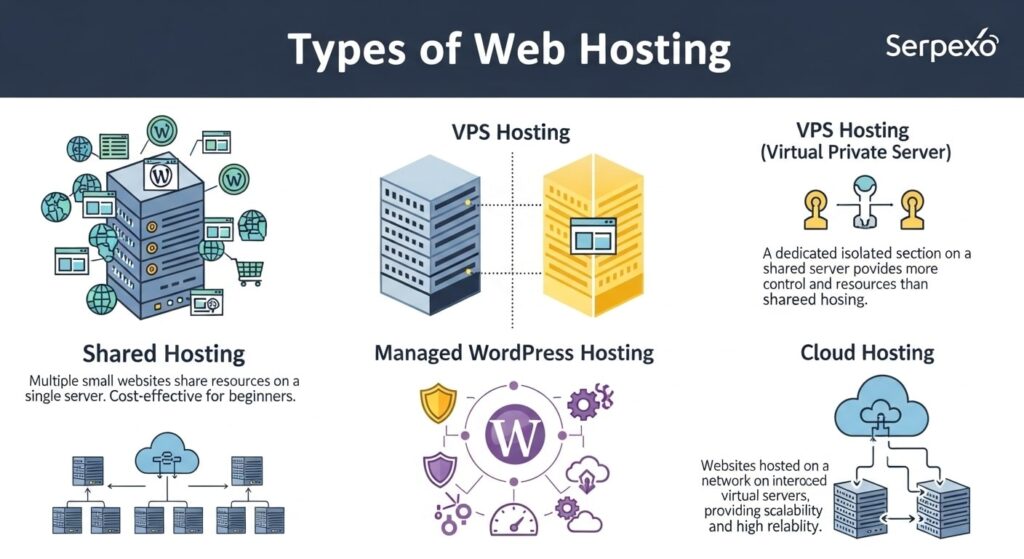
- Shared Hosting: You share server resources, such as space and power, with other websites. This setup is the most cost-effective option available, making it ideal for new websites and small businesses that receive light web traffic. It is particularly well-suited for startups, blogs, and portfolio sites.
- VPS (Virtual Private Server) Hosting: While you still share a server with others, you are given a dedicated, isolated section that comes with its own resources. This type of hosting provides more power and greater control compared to shared hosting options. It is ideal for growing businesses experiencing a rise in website traffic.
- Managed WordPress Hosting: A hosting service specifically crafted for WordPress websites, this solution ensures that all the technical details such as security measures, site speed, regular updates, and backups are expertly managed on your behalf. This enables you to dedicate your time and energy solely to running and growing your business. Ideal for: Businesses that depend significantly on their WordPress website.
- Cloud Hosting: Your website is maintained on a network of interconnected servers, commonly referred to as “the cloud.” This means that if one server encounters a problem, another server in the network takes over without any noticeable disruption. This setup is highly reliable and easily scalable, making it an ideal solution for e-commerce websites and other online platforms where maintaining consistent uptime is essential.
Our Evaluation Criteria: 5 Key Factors for Small Businesses
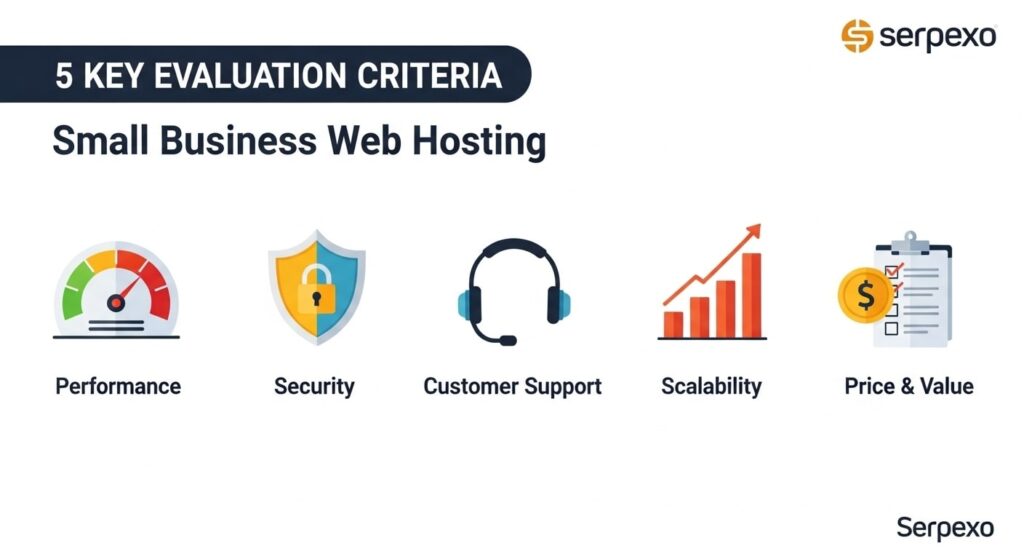
- Performance (Speed & Uptime): The speed of your website is crucial. A sluggish site not only frustrates visitors but can also negatively impact your site’s ranking on Google. Therefore, we prioritized hosting providers that offer fast SSD or NVMe storage options, utilize LiteSpeed servers for efficient data management, and provide a documented uptime guarantee of at least 99.9%. Ensuring your website remains continuously accessible is vital, as your customers should be able to find you whenever they are searching.
- Security: A security breach has the potential to severely damage a small business’s reputation, leading to loss of trust and customers. Therefore, it’s crucial to have protective measures in place. Key security features to look for include a free SSL certificate, which encrypts data and displays a “padlock” symbol in browser address bars, assuring visitors of your site’s safety. Additionally, robust security should incorporate malware scanning to detect threats, firewalls to block unauthorized access, and automated backups to ensure that data can be quickly restored in the event of an incident.
- Customer Support: In the event of an issue with your website hosting, having access to rapid and knowledgeable assistance is crucial. Therefore, we focused on selecting providers that offer round-the-clock customer support accessible through various channels such as live chat, phone calls, and support tickets, ensuring that you receive timely and effective responses to any concerns or queries you may have.
- Scalability: As your business expands, it is crucial that your web hosting solution can scale effortlessly along with it. We selected hosting providers that offer seamless upgrade options, allowing you to enhance your plan as your website traffic grows and your business demands evolve.
- Price & Value: We thoroughly evaluated hosting providers beyond just their lower introductory prices to encompass key factors such as the cost of renewal rates, which can significantly impact your long-term budget. We also took into account the availability of money-back guarantees, which provide you with peace of mind and flexibility to try out the service with reduced risk. Additionally, we assessed the value added through included freebies, such as a complimentary domain name, professional email services, and an SSL certificate, all of which contribute to a more complete and cost-effective package.
The 7 Best Web Hosting for Small Businesses in 2025
1. SiteGround: Best Overall Performance and Support
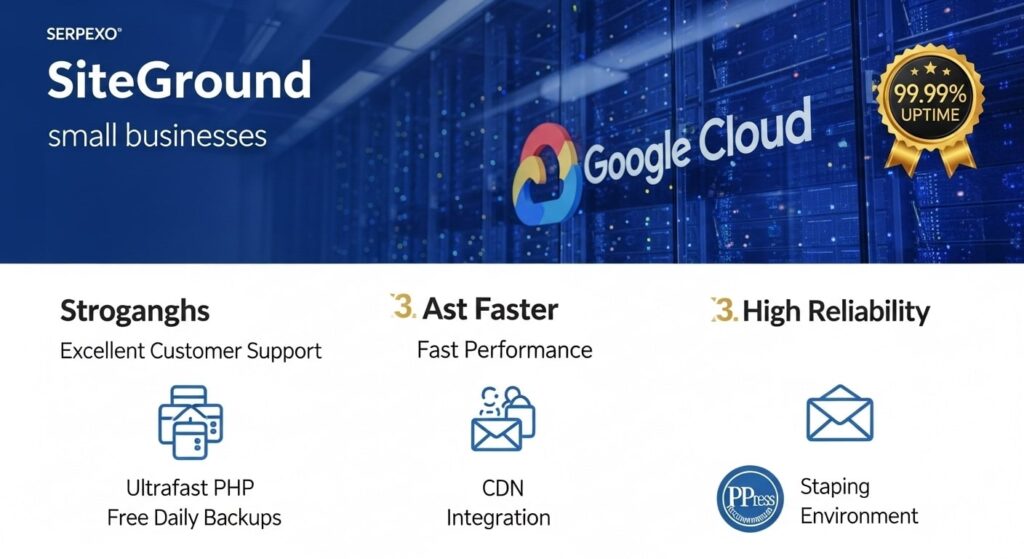
Best For: Businesses that value superior customer support and reliable, fast website performance above all else.
SiteGround is renowned for its exceptional performance, particularly in customer support and site speed. Though their pricing is somewhat higher compared to budget-friendly hosting services, the benefits they offer are truly worth it. The platform is constructed on the high-quality Google Cloud infrastructure, providing outstanding reliability. Their customer support team is distinguished by their quick response times, expertise, and truly supportive nature, which can be invaluable for business owners.
- Key Features: Google Cloud Platform offers a dependable and scalable hosting solution. With Ultrafast PHP, your website will perform optimally with faster loading times. Enjoy the peace of mind that comes with free daily backups, ensuring your data is always protected. Additionally, leverage the benefits of a free Content Delivery Network (CDN) to enhance site speed and performance globally. Access a free email service to stay connected professionally. Utilize the staging environment for testing changes safely before going live.
- Pros: Recognized for providing top-tier customer support, SiteGround boasts an impressive uptime rate of 99.99%, ensuring your website remains available and operational at almost all times. With strong security measures in place, including advanced anti-hacking systems, your business’s online presence is well-protected. Furthermore, SiteGround is one of the few hosting providers officially recommended by WordPress, underlining its credibility and reliability for hosting WordPress sites.
- Cons: Renewal costs can be higher compared to some other hosting services, and they often impose more stringent limitations on storage space than many of their competitors.
2. Hostinger: Best for Startups on a Tight Budget
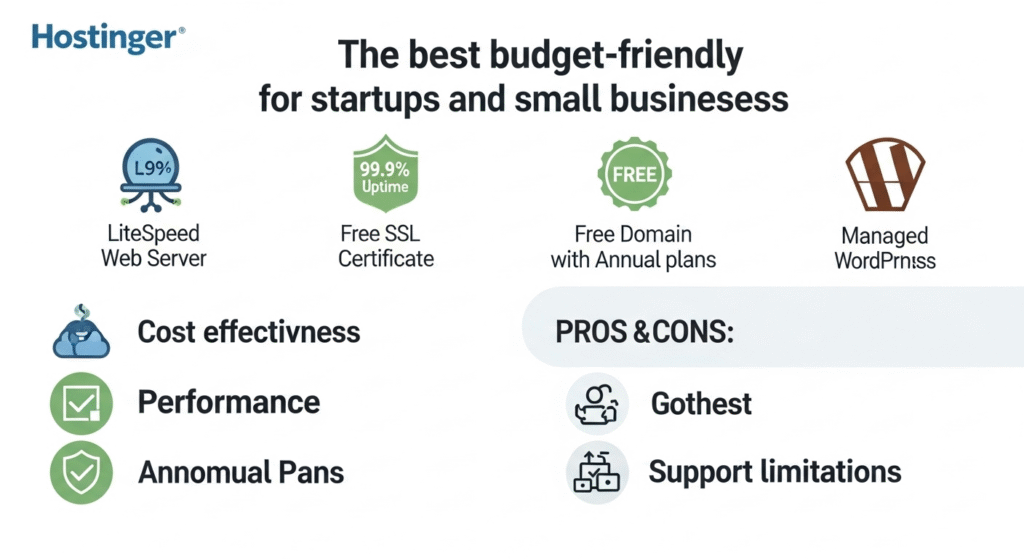
Best For: Businesses that value superior customer support and reliable, fast website performance above all else.
SiteGround is renowned for its exceptional performance, particularly in customer support and site speed. Though their pricing is somewhat higher compared to budget-friendly hosting services, the benefits they offer are truly worth it. The platform is constructed on the high-quality Google Cloud infrastructure, providing outstanding reliability. Their customer support team is distinguished by their quick response times, expertise, and truly supportive nature, which can be invaluable for business owners.
- Key Features: Google Cloud Platform offers a dependable and scalable hosting solution. With Ultrafast PHP, your website will perform optimally with faster loading times. Enjoy the peace of mind that comes with free daily backups, ensuring your data is always protected. Additionally, leverage the benefits of a free Content Delivery Network (CDN) to enhance site speed and performance globally. Access a free email service to stay connected professionally. Utilize the staging environment for testing changes safely before going live.
- Pros: Recognized for providing top-tier customer support, SiteGround boasts an impressive uptime rate of 99.99%, ensuring your website remains available and operational at almost all times. With strong security measures in place, including advanced anti-hacking systems, your business’s online presence is well-protected. Furthermore, SiteGround is one of the few hosting providers officially recommended by WordPress, underlining its credibility and reliability for hosting WordPress sites.
- Cons: Renewal costs can be higher compared to some other hosting services, and they often impose more stringent limitations on storage space than many of their competitors.
2. Hostinger: Best for Startups on a Tight Budget

Best For: Emerging businesses, aspiring bloggers, and individuals seeking dependable hosting services without breaking the bank.
Hostinger provides an outstanding entry into the realm of web hosting without the drawbacks of a “cheap” service. Their impressive speed is achieved with LiteSpeed servers, combined with a broad global network of data centers. Although their customer support is solid, it doesn’t quite match the excellence seen with SiteGround. Nonetheless, Hostinger remains a dependable web hosting provider, offering a 99.9% uptime guarantee, making them a smart and secure choice for any new small business venture looking for reliability.
- Key Features:Featuring LiteSpeed Web Server technology, a 99.9% uptime guarantee, complimentary SSL certificates, and a free domain with annual plans, this hosting service also offers managed WordPress capabilities.
- Pros: Highly cost-effective with outstanding performance for its price, featuring a user-friendly hPanel control panel and a 30-day money-back guarantee.
- Cons: Renewal fees exceed initial costs, and phone support is unavailable.
3. WP Engine: Best Premium Managed WordPress Hosting
Best For: Businesses that are already well-established, online retail stores, as well as developers, all of whom require the highest level of performance and robust security features for managing their WordPress websites.
WP Engine offers an elite, “white glove” hosting experience specifically for WordPress users. They manage all technical aspects, freeing you from those responsibilities. Their infrastructure is specifically optimized for WordPress, ensuring exceptional speed, top-tier security, and seamless automatic updates. While it is an investment, for businesses that heavily rely on their website, it’s undoubtedly a worthwhile expense.
- Key Features: Worldwide Content Delivery Networks (CDNs), EverCache® exclusive caching technology, Active threat monitoring, Automatic updates for WordPress and PHP, and Development staging environments.
- Pros: Rapid speeds, military-grade security, exceptional expert support, and essential developer resources.
Best for Beginners and WordPress Integration Costlier than competitors, limited to hosting only WordPress sites. 4. Bluehost:
Best For: Novice website owners seeking an effortlessly straightforward setup experience.
Bluehost stands out as one of the most reputable hosting providers and is among the three officially endorsed by WordPress.org. Their guided setup process and user-friendly dashboard simplify the launch of a WordPress site significantly. Although their performance may not consistently lead the charts, their dependable service and intuitive interface make them an excellent choice for beginners.
- Key Features:Complimentary domain registration for the first year, SSL certificate at no cost, free content delivery network (CDN), one-click installation for WordPress, and an intuitive dashboard.
- Pros: Exceptionally user-friendly, seamless WordPress integration, consistent uptime, and unlimited bandwidth on the majority of plans.
- Cons: Customer support may vary in quality, and performance may suffer on more affordable shared plans.
5. A2 Hosting: Best for Speed and Performance
Best For: Businesses requiring ultra-fast page loads, particularly crucial for e-commerce or media-rich websites.
A2 Hosting prioritizes speed above all else. As pioneers in implementing NVMe storage, their “Turbo” plans assure page loads up to 20 times faster. With a 99.9% uptime guarantee and round-the-clock “Guru Crew” support, A2 Hosting stands out as a prime choice for businesses that require rapid content delivery to users.
- Key Features: Turbo Servers offering speeds up to 20 times faster, NVMe Storage for enhanced performance, complimentary Website Migration, Anytime Money-Back Guarantee, and Litespeed Web Server integration.
- Pros:Blazing fast loading times, robust developer tools, and enhanced security with complimentary HackScan protection.
- Cons: Turbo plans come at a premium, and the dashboard may appear slightly outdated.
6. DreamHost: Best Value with Monthly Plans
Best For: Companies seeking a dependable long-term hosting solution without the need for a multi-year commitment.
DreamHost distinguishes itself with a generous 97-day money-back guarantee and straightforward monthly pricing. Recognized an official WordPress host, it is celebrated for reliable performance and a dedication to open-source technology. Their custom control panel is user-friendly and straightforward to use.
- Key Features: 97-Day Money-Back Guarantee, Complimentary Domain, Unlimited Bandwidth, WordPress Pre-installed, Customized Control Panel.
- Pros: Cost-effective monthly payment plans, extensive refund policy, reliable performance, and is independently held by its employees.
- Cons: Support relies mainly on a ticket-based system (live chat availability is not immediate), and cPanel is not provided.
7. GreenGeeks: Best Eco-Friendly Hosting
Best For: Companies striving for environmental responsibility without sacrificing efficiency.
GreenGeeks stands out as a leader in sustainability, utilizing 300% renewable energy in its operations. They achieve this by buying triple the energy they consume in renewable energy credits. Beyond their environmentally friendly approach, GreenGeeks ensures dependable performance with LiteSpeed servers, offers strong security features, and provides 24/7 customer support.
- Key Features: 300% Renewable Energy Commitment, LiteSpeed Technology, Complimentary Nightly Data Backups, Included Content Delivery Network, and Advanced Security Measures.
- Pros: Eco-conscious, excellent performance and dependability, includes all vital features at no extra cost.
- Cons: Renewal costs experience a notable increase.
Hosting Comparison & FAQs
Provider | Best For | Starting Price (Intro) | Uptime Guarantee | Key Feature |
SiteGround | Overall | ~$3.99/mo | 99.99% | Unmatched Support |
Hostinger | Budget | ~$2.99/mo | 99.9% | Unbeatable Price |
WP Engine | WordPress | ~$20/mo | 99.95% (SLA) | Managed Perfection |
Bluehost | Beginners | ~$2.95/mo | N/A (Reliable) | Ease of Use |
A2 Hosting | Speed | ~$2.99/mo | 99.9% | Turbo Servers |
DreamHost | Monthly Plans | ~$2.59/mo | 100% (SLA) | 97-Day Guarantee |
GreenGeeks | Eco-Friendly | ~$2.95/mo | 99.9% | 300% Green |
Frequently Asked Questions (FAQ)
What is the best website hosting service for small businesses?
For small businesses, SiteGround remains the top all-round option, thanks to its superb customer service, impressive speed, and strong security. However, if your priority is keeping costs low, Hostinger offers exceptional value.
Which website platform is best for small business?
This question often confuses hosting with platforms.
- Hosting Provider (like SiteGround, Hostinger): This is where you store the files for a site created using a CMS like WordPress, offering you extensive flexibility and complete ownership.
- All-in-One Platform (like Shopify, Wix): These providers include hosting in their offerings. Shopify excels for e-commerce needs, while Wix is ideal for straightforward, visually appealing websites. For service-oriented and content-driven sites, a self-hosted WordPress site provides excellent long-term prospects.
How much does hosting a website cost for a small business?
You can anticipate spending between $3 and $15 monthly for quality shared hosting during the initial year. After this introductory phase, renewal costs usually range from $10 to $25 per month. Be cautious of providers offering significantly lower rates, as this might lead to compromised performance and support.
Is GoDaddy good for web hosting?
GoDaddy is a well-known brand with functional hosting services. Nonetheless, it faces criticism for aggressive upselling tactics, performance that doesn’t quite match up to specialists like SiteGround or A2 Hosting, and potentially steep renewal rates. Although GoDaddy remains a viable choice, the providers discussed in this guide typically offer superior value, performance, and support tailored to small businesses.
Final Verdict: Making the Right Choice for Your Business
The “best” web host is the one that aligns with your business’s specific stage, budget, and technical comfort level.
- If you’re just starting and cost is a major factor, go with Hostinger. You simply won’t find a better combination of price and performance.
- If you value peace of mind and want expert support to have your back, invest in SiteGround. It’s the best all-around package.
- If your WordPress site is your most important asset, choose the managed excellence of WP Engine to protect and accelerate it.
Your website is your digital storefront. Choosing the right hosting is the first and most important step in building a strong foundation for your business’s online growth. The right choice will pay for itself many times over in happy customers and a reliable, fast online presence.
